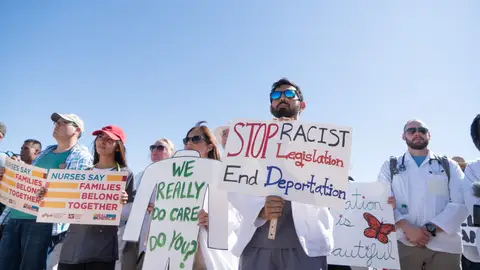Why Queer People Should Care About the Border Crisis

Why should we care? Because we have to. In moments when children are being forcibly removed from their parents, treated like criminals, and caged in shelters, when immigrant families are incarcerated and criminalized instead of welcomed, our queer community has no option than to stand up in solidarity.
We should care about the migrant crisis because it is a threat to basic human dignity. An injustice anywhere is a threat to justice everywhere, Dr. Martin Luther King, Jr., said. And the injustices of the migrant crisis are happening right here, right now. These barbaric and grave human rights violation are unfolding in our own home and our queer community can’t and won’t stand in silence.
"Families Belong Together March" protest in downtown Los Angeles, California on June 14, 2018.
We can expect to achieve freedom and equality by only focusing on our own struggles, yet we have to be intersectional and fight for the liberation of other marginalized populations. We can’t even call equality having same-sex marriage, when many of our LGBTQ communities are still imprisoned, deported or fired for being who they are. Many of us, should be aware of our privileges that we have, that we can still speak up and act, when the most vulnerable in our communities are silenced, marginalized or even dead.
We must care because immigrants rights are also LGBTQ rights. Queer and immigrant communities are too familiar with the impact of migration, patriarchy, and persecution. Immigrant families are fleeing violence, natural or economic devastation but many—especially trans people—are running away of deadly homophobia and transphobia.
Temporary detention centre for illegal underage immigrants in Tornillo, Texas, US near the Mexico-US border, as seen from Valle de Juarez, in Chihuahua state, Mexico on June 18, 2018.
The queer and immigrant communities have intertwined and overlapping histories of oppression and persecution from a patriarchal, militarized, and racist state. Many of us—queer or immigrant—have ran away from toxic places marked by homophobia, misogyny, and violence targeted towards our gendered or colored bodies. I consider myself a “sexile” who fled Puerto Rico because of society with homophobic and conservative views, and this is a place part of the United States. Yet, queer immigrants in Latin American countries face the horrors of machismo, violence and injustices driving them north in pursuit of lives free of discrimination and persecution. And how do we receive them?
It is not coincidental, many of the immigrants fleeing to the U.S. are queer people, like the 25 transgender women who came in the 300 caravan looking for a better life. Not coincidental either that many of the immigrant rights activists or groups are queer people as well. Activists like trans Latinx Jennicet Gutierrez—who put the issue front and center after calling out President Obama for the detention of trans women—and intersectional groups like Undocuqueer.
The death of Roxsana Hernandez while in the custory of ICE is one of the latest that exemplify the intersectional struggle and the impact of the state’s white supremacist and anti-queer agenda. Roxana, a 33-year-old woman from Honduras, came to the United States as part of an immigrant caravan through the U.S.-Mexico border, seeking asylum. Instead of refuge, Roxsana, who was living with HIV, was caged in an freezing “ice box” at a detention center by U.S. Customs and Border Protection, where she died in ICE custody after lack of access to medical care. Beyond deportation, for many LGBTQ people, migrating to America represent an issue of life or death.
Rally outside the El Paso County Detention Center to protest separating children from adults during detention on June 21, 2018 in El Paso, Texas.
On top of all that trauma, queer and trans immigrants are being caged in private detention centers where they are 97 times more likely to be subject to sexual abuse due to lack of responsible policies, negligence and active abuse. Queer people subjected to sexual abuse enabled by the state like the case of trans woman Laura Monterrosa from El Salvador, whose multiple accusations of sexual abuse ICE dismissed and ultimately closed her case.
The treatment and incarceration of vulnerable populations of LGBTQ and immigrant individuals under immigration authorities in this country borders in human right violations. As the Center for American Progress revealed last month ICE is violating its policies as “LGBT immigrants are being held in detention for long periods of time, in unsafe conditions, and at a far greater risk of sexual violence than the general population.”
This white supremacist, racist and heteronormative agenda of the Trump administration began by going after and terrorizing immigrants, then stripping dreams away from Dreamers by rescinding DACA, and then wiping away any trace of an LGBTQ mentions from the White House platform. They took away funding from human rights, HIV and health programs and increased militarization funding to criminalize, deport and persecute immigrants and people of color—many of whom happen to be LGBTQ as well.
We are fighting the same enemies. Our struggles are interrelated and our liberation depends on all of us stepping up for each other. None of us is free, until all of us is free.
For more about the Latinx movement follow the work of activists Jennicet Gutierrez, Bamby Salcedo, Jose Antonio Vargas, Bianey de la O, Jorge Gutierrez, Cecilia Gentili, Paola Ramos, Luis Mancheno, Amir Ashour, and many others.
Follow the intersectional work of groups like Familia TQLM, Undocuqueer, NETA RGV, TransLatina Network, Trans People of Color Coalition, Queer Detainee Empowerment Project, or Lorena Borjas Foundation, and Latinx for Equality in America.





